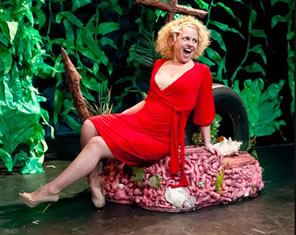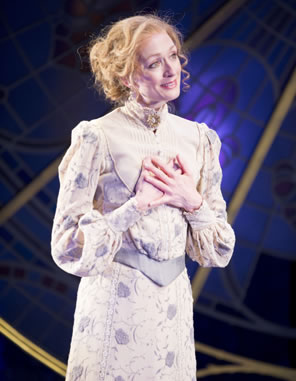An Interview with Olivia and Maria
[Return to Introduction]
Have you ever played Viola?
No, I haven't. Actually, Olivia was my first time spending any time with this play. It's just one of those plays that I never even had auditioned for before the Taffety Punk production. I remember doing a scene in grad school acting class where I played Viola, and that was it. That was all the time I spent with this play.
What scene was it with Viola?
The willow cabin scene. That's always the acting class scene. [Laughs]
Did you know the play very well before you did it at Taffety Punk?
I'd seen it several times, I've read it, of course, but it wasn't one that I felt real close to. I definitely had to do a lot of prior research before the Taffety Punk show.
Why didn't you feel close to it? It didn't appeal to you?
No, I've always loved it. It's just one I never intersected with as much. I've done several Much Ados, a bunch of Taming of the Shrews.
So you've done Beatrice and Katherine.
Yep. I've done As You Like It. And for some reason, this one I've never had the opportunity.
Who did you play in As You Like It?
I played Phoebe a few years ago at the Folger. I had a great time. She's crazy.
I was going to say I could see you as Phoebe. So you've not played Rosalind or Celia. How about Portia?
I played Portia in a project with a company in Chicago called the Shakespeare Project, where you take the readings [of the play] to the library.
Yeah, we just saw them last week.
Did you really?
We saw Edward III.
Oh, cool, cool.
We actually trained up there to see that and Babes with Blades' Julius Caesar—
Oh, they're very cool.
—and we saw the Othello Remix at Chicago Shakespeare, a new rap version of Othello. And loved it. Loved it. But that was the first time I'd seen [The Project]; I didn't know you had worked with them.
When I was living there, right before I left, actually, I got hooked up with them. I played Portia in Merchant for them and I also played Julia in Two Gents with them. I'm a big admirer of their work.
So you've got pretty good Shakespeare cred.
Yeah, well, I hope so. [Laughs] It's what I've focused on in my career and I love doing it. That and Restoration comedy are my two favorite things to do.


Two Olivias: Tonya Beckman in the Taffety Punk production of Twelfth Night (photo by Teresa Castracana) and Rachel Pickup in the Folger production (photo by Scott Suchman)
So, my take on Twelfth Night is that Shakespeare, who wrote great women in a lot of the plays, really seemed to nail it big time with the three women in Twelfth Night.
Yeah.
He comes through with these three very distinct—
Yeah, they are all so different.
Viola maybe is the culmination of all the heroines leading up to that, but does Olivia have anybody comparable in the canon?
You know, I'm not sure. I think there are some similarities between Portia and Olivia in the grace that they have. I think of them both as very graceful people. But I don't really see a strong parallel between Olivia and any other character.
Expound on that inner grace. I never thought of Olivia in that way. Where do you get that?
So hard to explain. It might just be an instinctual thing for me; I can't pull something out of the text to explain it. Maybe it's resolve. If you're going to give Olivia a modern parallel, she'd be a celebrity, maybe like a TV celebrity who is hounded by the press. Because, in this play, the only character who doesn't want something from her is Viola, which I think is why [Olivia] falls in love with her. And all these different people who all want something are pursuing her, and I think that makes you set yourself apart and away from people and is a very lonely thing. That's where I think her self-centeredness can come from. That's how I saw it when I started with the part.
Did you like her?
I did like her. I did.
Do you still like her?
I do. It's very interesting to watch someone else playing it right now so soon after I just played it. It's completely different, and Rachel Pickup, who plays Olivia in the Folger production, is so much more vulnerable than I played her. And it's really beautiful. It's lovely to see a completely different interpretation that makes me like her even more.
Do you think Viola—I'm sorry, Olivia gets short shrift when we all talk about the great Shakespeare women?
Yes. She has beautiful poetry that everyone forgets about. So, yeah, absolutely I think that people tend to forget about her.
Why do you think that is? Is it because of Viola? I mean, Viola's got the willow cabin speech.
Viola does have the willow cabin.
She's also got patience on a monument.
Yes, a beautiful scene. Olivia has wonderful extremes that Viola doesn't have. Viola is very centered and down-to-earth. Olivia is much more like Orsino in her wild back-and-forthness, which for an actor is really fun to play. But it's not her story, really; it's Viola's story and I guess that's why we tend to put so much of the focus on Viola.
And then Maria. There are several waiting women in Shakespeare. The others tend to be close friends with the mistress, but except for the one scene where Viola first shows up and then when Maria brings in Malvolio, there's not a lot of interaction between you and your mistress.
Not a lot of talking. We're together a lot. I follow her around constantly. But it's not like a companion in the way Lucetta and Julia are or Portia and Nerrisa. It's a different relationship. Our costume designer gave me the way to think of her when she was talking about the rendering one day and they decided she wasn't a housekeeper but maybe she's a lady's maid, and then the costume designer said, "I think of her as like her social secretary." You know, a little higher up on the food chain, but it's still a boss-employee kind of relationship. Because there isn't a lot of—Olivia censors herself when Maria's in the room. There's one scene where she's talking about Cesario and realizes that Maria's there and stops herself, so there isn't the "I'm going to tell you all my secrets because you're my confidante" kind of relationship.
Which is kind of unusual among those relationships in the other comedies.
Yeah, it is unusual.
[To continue the interview, click here] [For a PDF of this interview, click here]



 Find additional Shakespeareances
Find additional Shakespeareances